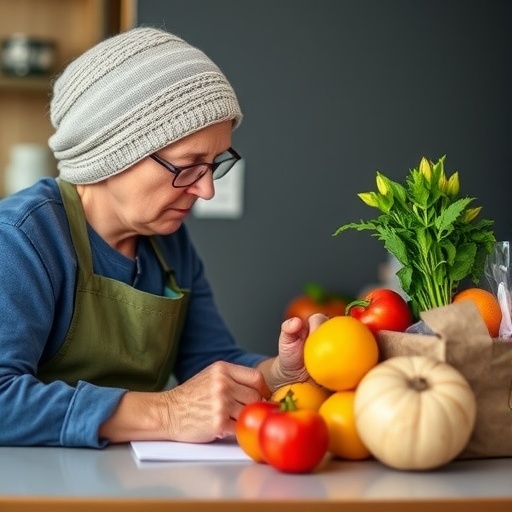A groundbreaking new study published in JAMA Health Forum sheds light on an often overlooked but critical factor affecting the survival prospects of cancer survivors: food insecurity. The research, conducted by a team at the University of Pennsylvania Perelman School of Medicine, reveals that lack of consistent access to nutritious food corresponds to a significant increase in mortality risk among this vulnerable population. This discovery unveils an urgent and complex public health issue warranting renewed attention from clinicians, policymakers, and advocates alike.
Food insecurity, defined as the limited or uncertain availability of nutritionally adequate and safe foods, currently affects more than 40 million people in the United States. Its widespread prevalence is well-documented in relation to general population health; however, this study pioneers the examination of its direct impact on individuals with a history of cancer diagnoses. Cancer survivors frequently face unique and multifaceted health challenges, including long-term treatment side effects, compromised immune systems, and heightened vulnerability to chronic illnesses. Introducing food insecurity as a risk modifier in their health trajectory adds a new dimension to survivorship care models.
The researchers capitalized on data from the 2011 and 2012 National Health Interview Surveys (NHIS), leveraging the government’s extensive health database capturing demographics, health conditions, and behavioral factors. Overlaying this dataset with mortality outcomes verified through the National Death Index extending to 2019, the study analyzed responses from 5,603 adults aged 40 and above, each reporting a previous cancer diagnosis. Participants also answered detailed questions assessing their food security status, enabling the research team to identify a subset (10.3%) classified as food insecure.
Statistical adjustments for confounding variables — including age, sex, smoking habits, and other existing medical conditions — revealed that food insecurity independently correlates with a 28% relative increase in the risk of all-cause mortality for cancer survivors. This elevated mortality rate persisted even when accounting for these potential biases, underscoring food insecurity as a standalone predictor of poorer survival. The findings hold profound implications: the ability to access healthy food is not merely a socioeconomic issue but an essential component of cancer survivorship and long-term outcomes.
Moreover, the investigation delved deeper into subgroups, particularly focusing on those food-insecure participants not enrolled in federal food assistance programs. This cohort experienced an alarming 42% relative increase in both all-cause and cancer-specific mortality. This stark disparity highlights the protective role government aid programs can play, simultaneously emphasizing gaps in reach or utilization of these resources by at-risk populations. Such data advocate for broadening eligibility criteria and intensifying efforts to connect patients to nutritional support systems.
Cancer survivorship is increasingly recognized as a crucial phase requiring holistic care beyond the treatment horizon. Malnutrition and dietary insufficiencies have been previously linked with weakened immune responses, reduced tolerance to ongoing therapies, and impaired recovery. The present findings extend this understanding by quantifying mortality risk related to food insecurity, thereby integrating nutritional status as a pivotal metric within survivorship evaluation. Incorporating routine food security screening in outpatient oncology clinics may pave the way for timely interventions.
Dr. Jaya Aysola, associate professor of medicine and executive director of the Centers for Health Equity Advancement at Penn Medicine, emphasizes that “food matters in cancer care and outcomes.” The intuitive yet powerful message–that ensuring access to nutritious food can prolong life–demands multidisciplinary collaboration between healthcare providers, social workers, and public health officials. Strategic food assistance integrated with clinical care pathways represents a tangible, scalable opportunity to mitigate health disparities among cancer survivors.
Technically, food insecurity introduces chronic stress and malnutrition-induced physiological challenges, which may exacerbate cancer progression or impair healing processes. Inadequate dietary intake can elevate systemic inflammation, disrupt metabolic balance, and compromise antioxidant defenses, collectively undermining cellular repair mechanisms vital after oncologic treatments. Furthermore, food insecurity often coexists with other social determinants such as housing instability, limited healthcare access, and psychological distress, amplifying cumulative risk.
The study’s robust methodology, including longitudinal follow-up and comprehensive covariate adjustment, strengthens the validity of these conclusions. The utilization of nationally representative datasets ensures wide applicability, while the linkage to mortality outcomes offers direct clinical relevance. Nevertheless, the research acknowledges inherent limitations such as self-reported cancer status and potential residual confounding, calling for future prospective studies to corroborate mechanisms and intervention efficacy.
From a public health perspective, the findings invigorate ongoing debates about the expansion and optimization of food assistance programs like SNAP (Supplemental Nutrition Assistance Program) and WIC (Women, Infants, and Children), particularly tailored to cancer survivors and other chronically ill populations. Elevated mortality risks highlight the need for integrated policies encompassing food security as a fundamental determinant of health equity. Addressing these social determinants aligns with broader cancer control strategies aimed at reducing health disparities.
In conclusion, this landmark study unveils the hidden but lethal influence of food insecurity on cancer survival. It underscores the necessity to incorporate nutritional security into clinical cancer care frameworks and policy initiatives alike. As the population of cancer survivors continues to grow, ensuring equitable access to healthy food must become a central pillar in supporting long-term health and extending life. Through combined efforts in research, healthcare delivery, and social policy, the pernicious impact of food insecurity may be effectively curtailed to improve outcomes for millions living beyond cancer.
Subject of Research: Mortality outcomes among cancer survivors experiencing food insecurity in the United States.
Article Title: Mortality Outcomes for Survivors of Cancer With Food Insecurity in the US
News Publication Date: 20-Jun-2025
Web References:
- JAMA Health Forum article
- University of Pennsylvania – Centers for Health Equity Advancement
- Faculty page of Jaya Aysola MD, MPH
Keywords: Oncology, Health equity, Health disparity




